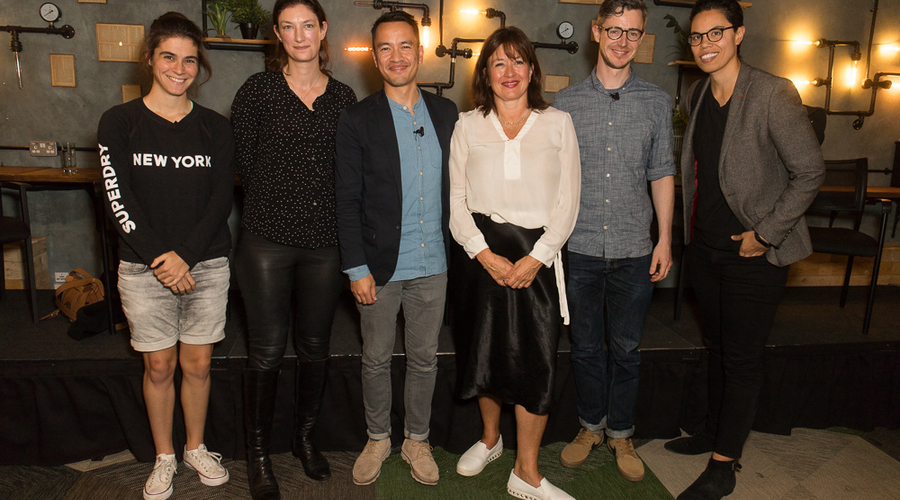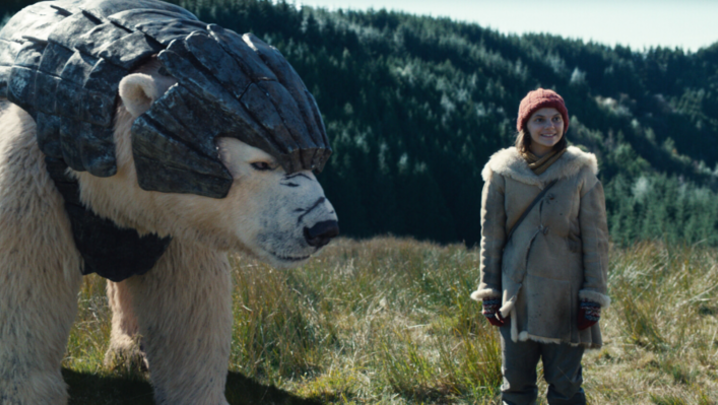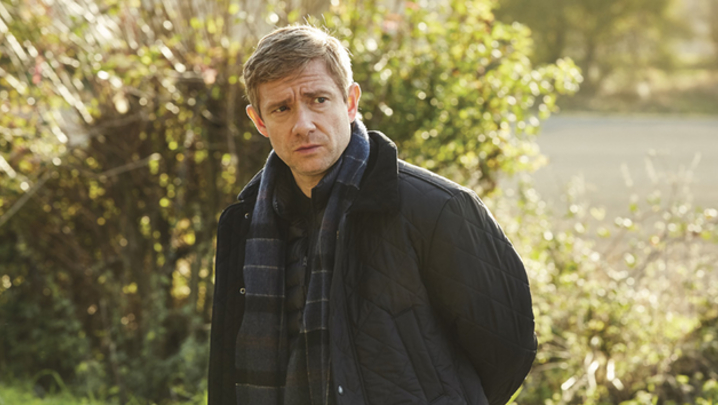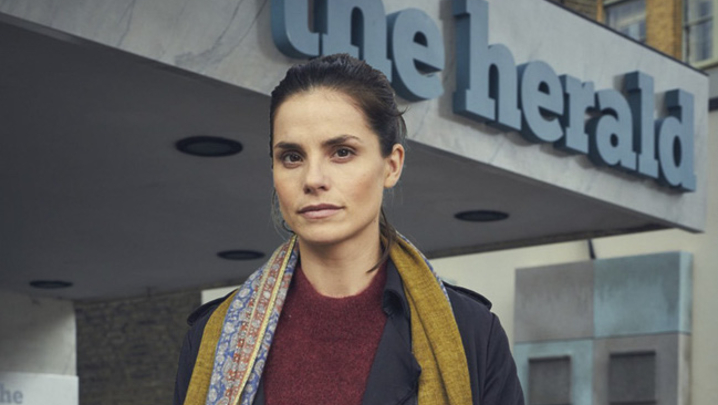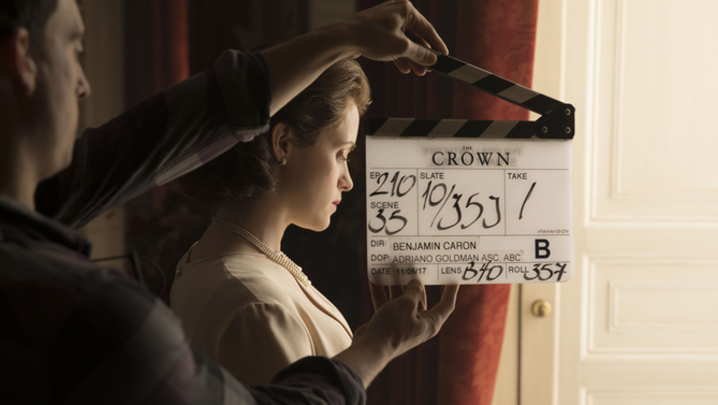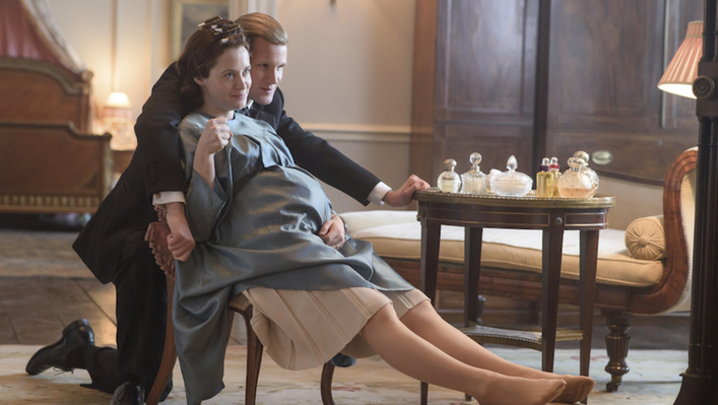Matthew Bell takes notes as top screenwriters explain how to pen a hit drama
Let out of their garrets for the evening, a panel of TV dramatists revealed at an RTS Futures event how they come up with ideas, pen words – and deal with writer’s block.
John Jackson, whose writing credits include ITV’s Grantchester and Sky Atlantic’s The Tunnel, chaired the sold-out mid-October event, “Scriptwriting for TV drama”, which featured writers from some of British TV’s biggest and best dramas.
“It’s important for me to have something to say. We’ve all written stuff that’s competent and empty,” said Sophie Petzal, whose breakthrough came on CBBC’s Wolfblood. More recently, she has written episodes for Sky Atlantic’s Riviera and BBC Two’s The Last Kingdom, and has original scripts in development with Company Pictures.
“Given the world we live in,” continued Petzal, “you should say something, even if that’s just to make people happy in a dark time.”
Rachel Flowerday, whose credits include BBC One shows EastEnders, Father Brown and The Moonstone, admitted to spending “a vast amount of time procrastinating on the internet”. Yet, she added, “That is where my ideas come from. I’m pretending not to work and I find that I’m working, after all. It’s really insidious.”
Flowerday, who is working on original material for ITV and Channel 4, puts her ideas into an email, which she always fires off: “If I put it into a Word document, it’s too scary and [the idea] has to be perfect. I capture my enthusiasm and don’t edit it away into nothing.”
John Jackson explains how he got started
‘I saw an advert in a newspaper to be a runner for ITV.… I didn’t get it, but they kept my CV and I got a call for [another] show.… One day, I was photocopying and someone got sick or was sacked and I was asked to write something and then I was writing.…
‘To get those jobs, it helps to have something on your CV. Before that, I’d been an agent’s assistant on work experience from school – the tea and fax person.… It was how I found my first agent.
‘I went back when I had my first [writing] job and asked them to do the contract for me, and then I got more work.… Try and get in somewhere – it is hard to start as a writer.’
“If I have an idea and I like it, then I get very enthusiastic about it,” said Daisy Goodwin. “I like to pitch in person before I send people drafts, because I think that there’s no substitute for telling the story yourself.” After a stellar TV career as a producer of factual shows, such as Channel 4’s Grand Designs, she turned to fiction, creating and writing ITV’s hit series Victoria.
A common complaint about TV drama is that it is obsessed by the past. Goodwin, however, makes “no apology” for writing about the 19th century. “If you forget history, you’re condemned to repeat it,” she said.
Recent episodes of Victoria have featured the Corn Laws, a huge political conflict that split Britain much as Brexit does now, and the Irish potato famine: “That, amazingly, is something that has never been done as a drama on British TV,” she said. “I try, wherever I can, to show that Victorian England was much more diverse and polymorphous in its attitudes towards race and sexuality than we think.” “Not every idea has to be a perfectly formed creature,” said David Hancock, a script executive and writer at Left Bank Pictures, who is currently working on Netflix drama The Crown. “There should be a high attrition rate until the [good idea] comes along.”
Drama development producer Rachelle Constant receives writers’ ideas, whether good, bad or indifferent. She is looking “to be excited by [a writer’s] excitement”.
Constant began as a script editor at ITV, working on series that included Lewis, before moving to the BBC, where she currently works for the BBC Writers Room.
New writers, she argued, need “a really strong sample script to show off your work – without that, there’s not much hope”.
Agents help writers place their scripts and, crucially, negotiate with producers when a programme is commissioned. “I got an agent when I needed one to do a deal,” recalled Hancock.
It is possible – though harder – to find work without an agent. “If, by some chance, you do end up writing, agents will beat a path to your door,” he said. “Agents, development people and producers are desperate to read something good, even if it’s rough around the edges.
“When a script by a new or newish writer jumps off the page at you, it’s one of the biggest thrills [that you get] working in development.”
 Grand Designs on historical drama: Daisy Goodwin's story
Grand Designs on historical drama: Daisy Goodwin's story
‘[Following] university and… [an MA at] Columbia’s film school in New York… I went to the BBC as a production trainee and then… made arts documentaries for about 10 years.…
I went to work for Talkback… and started its factual department – pretty much every property porn show you’ve ever watched, I probably had a hand in.
I left and started my own factual company [but] I parted company with the parent company that had bought my company because I realised that I was quite good at having ideas but really bad at running a company.
‘I’d written two novels and Victoria had crept into both of them, so I thought about [writing] a novel about the young Victoria. As I thought about it, I had a fight with my teenage daughter, who was so… full of hormone-driven fury that I thought, “I wonder what it would be like if she were to wake up tomorrow morning and to find herself the most powerful woman in the world?” Which is exactly what happened to Victoria.…
I bumped into an agent at a party… sent him a treatment… and Mammoth Screen commissioned a script. It got commissioned about four months later. It was unbelievably lucky.’
In the early part of her career, Flowerday was able to generate her own work, largely because her place in the BBC’s Writers Academy led to regular gigs on the BBC soaps EastEnders and Casualty.
“There wasn’t a great deal for [my agent] to do apart from negotiating [contracts], but that’s the key thing – having someone on your side,” she said.
Once an idea has been accepted, the writer has to produce the script. Goodwin admitted to a “Stakhanovite” work rate, knocking out seven to eight pages a day, and taking 10 days to write an hour of TV.
She works at the members-only London Library, surrounded by fellow writers. “It’s a good feeling – you’re all tapping away and feeling the pain,” she said, adding: “You can get four good writing hours out of a day.”
Hancock argued that “starting early is crucial, before the snow globe of your brain has been shaken by emails, phone calls and life happening – all the things that can distract you”.
Writers draft and redraft their copy, taking on board the advice, or “notes”, of the script editors and producers who read their scripts. “Often, I send stuff in too early because I like to have notes,” said Petzal. “I love discussing how you’re going to make [scripts] better.”
All writers experience doubt – at their lowest ebb, some are so gripped by fear that they are unable to put pen to paper. Hancock described the feeling of being “frozen” while writing a first draft, a problem he solves by disgorging words, the so-called “vomit draft”. He added: “You can rework it – something written is better than something not written.”
“You can do all the planning and outlines, but you just need to sit down, write and let it go. Sometimes, you’ll get up and think, ‘Who wrote that?’ – and that’s really exciting,” said Goodwin. “You have to apply the seat of the pants to the seat of the chair and stay there and write – set yourself a target and don’t move until you’ve done it.”
Screenwriting for Dummies: Sophie Petzal's path
‘I didn’t know that people wrote film or television until I was about 15, when my mum got me Screenwriting for Dummies.… since then, that was all I ever wanted to do.
‘I went to Bournemouth University and studied scriptwriting, film and television writing but, in my second year, I left and [entered] the BBC production traineeship.
‘That led me to CBBC drama, where I was assistant script editor on Wolfblood, which led me to writing for it and, then, other CBBC dramas.’
‘Scriptwriting for TV drama’ was held at the Den, Bedford Square, in central London, on 16 October. It was produced by Carrie Britton and Jude Winstanley.

